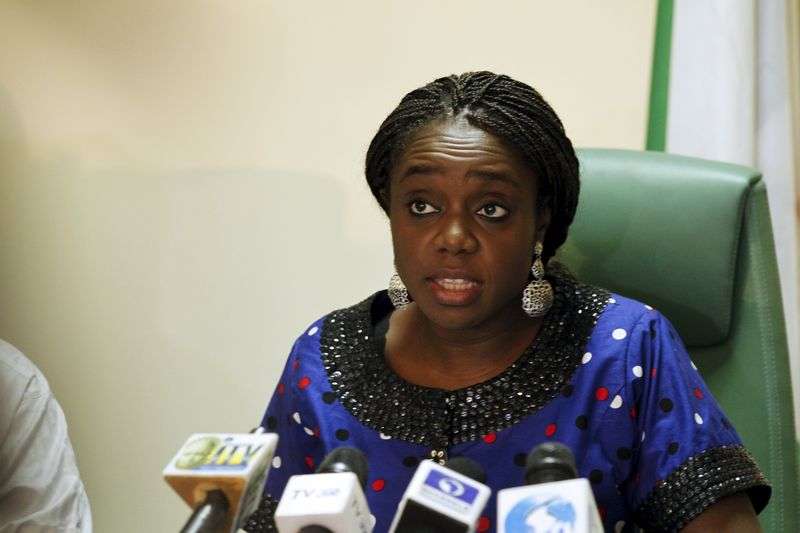- FG Reappoints Consortium of Banks to Handle $2.5bn Eurobond
The Federal Executive Council on Wednesday reappointed a consortium of banks to handle the nation’s $2.5bn Eurobond issuance.
The Minister of Finance, Mrs. Kemi Adeosun, disclosed this to State House correspondents at the end of the weekly FEC meeting presided over by President Muhammadu Buhari at the Presidential Villa, Abuja.
Adeosun listed the banks as Citi Group, Standard Chartered, Stanbic IBTC, Whitten-Case and African Practice.
She said the proceeds of the $500m bond issued in November 2017, which she put at about N162.50bn, were used to redeem Nigerian Treasury Bills, which matured in December 2017.
“The immediate impact was a significant drop in the bid rates at the auctions of both the NTBs and FGN Bonds in December 2017 and January 2018,” she stated.
According to the minister, the NTBs dropped from about 16 per cent to 13 per cent, while the bonds dropped from about 16 to 16.50 per cent to 13.50 per cent.
The Minister of State for Aviation, Hadi Sirika, said the council approved the substitution of Lufthansa Consulting with the Airline Management Group and Avia Solutions GE to join the other members of the consortium that would provide transaction advisory services for the establishment of a national carrier at the same cost of N341.2m.
He stated, “Today, the council considered a memo from transportation regarding aviation. It was a memo that was brought to substitute a member of the consortium that will provide transaction advisory services for the establishment of the national carrier. That member of the consortium is Messers Lufthansa Consulting.
“Council considered and approved that substitution with another company called AMG (Airline Management Group) with Avia Solutions GE to join the other members of the consortium to continue providing that at the same cost of N341.2m.”
Sirika attributed the substitution to two reasons, “One, that particular member of the consortium, Lufthansa Consulting, in the wisdom of the council, we felt that Lufthansa Consulting is an appendage of the airline group and that might bring conflict of interests because Lufthansa themselves may want to join, partner or help in the process during the procurement phase of this transaction.
“Of course, they are members of Star Alliance, members of One World and members of Sky Team, others may feel short-changed that the person advising us to set up this airline, which is going to be private sector-driven, is a member of an alliance, which they are not part of.
“Secondly, since we appointed the transaction advisers in various aviation projects in May 2017, about six of them; five of them have gone ahead, the one for construction of airport, the one for aerotropolis and the one for MRO and so on and so forth. Most of them have produced the outline business cases and we are on our way to doing the full business case.
“However, Lufthansa Consulting did not accept the offer, neither have they signed any contract. They countered the offer instead.
“One of the conditions is that we should pay them 75 per cent of the total cost, which is against our procurement law; they also wanted us to change the contract from naira to euro; they also wanted us to open an escrow account in an internationally recognised bank outside the country where the money will be domiciled.”
Sirika added, “So, we found that that was against our procurement law and we have been going back and forth for seven months to see whether they can accept the terms of conditions and even if they had done at a time and they didn’t up till today; we couldn’t continue with them because it will compromise the system, which we thought should be transparent.
“So, that is why we sought the approval of council to substitute them why a neutral person and someone who will accept the terms and conditions given – to accept payment in naira, to accept 15 per cent payment of the entire cost as against 75 per cent etc.”
On his part, the Minister of Interior, Abdulrahman Dambazau, said FEC approved the purchase of 35 operational vehicles for the Nigeria Immigration Service at a cost of N483.21m, including the cost of painting the vehicles in NIS colours for N4.09m.
He said the present administration had approved 17 memos for various procurement and others.
The Minister of Communications, Adebayo Shittu, said the council also approved the purchase of equipment to detect illegal radio signals with a view to blocking them.


 Naira4 weeks ago
Naira4 weeks ago
 Naira4 weeks ago
Naira4 weeks ago


 Naira4 weeks ago
Naira4 weeks ago




 Naira3 weeks ago
Naira3 weeks ago
 Commodities4 weeks ago
Commodities4 weeks ago


 News4 weeks ago
News4 weeks ago


 Banking Sector4 weeks ago
Banking Sector4 weeks ago
 Travel4 weeks ago
Travel4 weeks ago























